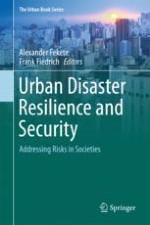2018 | OriginalPaper | Chapter
17. An Indicator-Based Approach to Assessing Resilience of Smart Critical Infrastructures
Authors : A. Jovanović, K. Øien, A. Choudhary
Published in: Urban Disaster Resilience and Security
Publisher: Springer International Publishing
Activate our intelligent search to find suitable subject content or patents.
Select sections of text to find matching patents with Artificial Intelligence. powered by
Select sections of text to find additional relevant content using AI-assisted search. powered by
